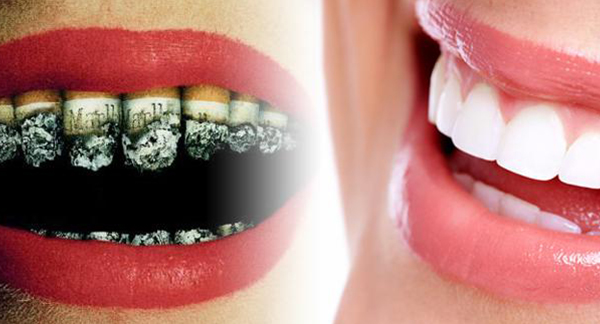Normanhurst NSW 2076, Australia
After hours (Available by Appointment)

People who smoke have a higher risk of gum problems, having complications after tooth extractions and surgery in the mouth, and developing oral cancer. Smokers have a lowered resistance to infections and have impaired healing.
Stopping smoking reduces the risk of developing gum disease and oral cancer, and improves the person’s response to gum treatment. It is very important for smokers to visit their dentists regularly to keep their teeth and gums healthy and have regular oral cancer checks.
The most common oral problems affecting people who smoke are:
Periodontal (gum) disease is caused by an infection that destroys the bone surrounding and supporting your teeth. This bone holds your teeth into your jawbone and allows you to chew comfortably. Bacteria and food debris called dental plaque can trigger gum disease.
If left on teeth and gums, plaque hardens to form calculus or tartar. The plaque and calculus irritate the gums around teeth. As gum disease progresses, more bone is lost. Teeth become loose and may fall out by themselves or have to be removed by a dentist.
Smokers typically do not have bleeding gums as they have poor blood supply to the gums, so their gum disease is often masked.
People who smoke less than 10 cigarettes per day are two times more likely to develop gum disease. This increases to four to five times more likely in heavier smokers. Also, the more cigarettes smoked, the worse the gum disease. Smokers do not respond as well to gum treatment as non-smokers.
Smokers are at a higher risk of developing acute necrotizing ulcerative gingivitis, a very painful condition of the gum, which smells and tastes terrible.
Encouragingly, people who stop smoking have the same risk of developing gum disease and responding to gum treatment as non-smokers.
People who stop smoking may notice that their gums bleed more. The bleeding should stop after gum treatment from your dentist or dental hygienist, and cleaning your teeth properly.
Please see your dentist if you notice any signs and symptoms of gum disease, including:
If you are a smoker, there are some things you can do to prevent tooth and gum problems, including:
Oral cancer is cancer of the mouth, including the tongue, cheek, palate, floor of the mouth and lips. Of people with oral cancer, 75 per cent are smokers. People who smoke 40 cigarettes per day and drink four alcoholic drinks per day are 35 times more likely to develop oral cancer than non-smokers and non-alcohol drinkers. The risk is much lower in people who only smoke or only drink alcohol.
People who stop smoking and stop drinking alcohol have the same risk of developing oral cancer as non-smokers after 10 years. Also, non-smokers with oral cancer are three times more likely to survive than non-smokers.
Oral cancer in smokers is most likely to occur on the side of the tongue and the floor of the mouth. Treatment for oral cancer includes surgery, radiotherapy and tooth extractions.
Please see your dentist immediately if you notice any:
People who smoke are more likely to develop a 'dry socket'. This is a poorly healing tooth socket after a tooth extraction, which is very painful.
People who smoke are also more likely to have pain after other oral and gum surgery. Dental implants are less likely to integrate or 'take' in people who smoke than in non-smokers.
Contact your dentist if you have any problems after a tooth extraction, oral and gum surgery, including dental implant surgery NORMANHURST DENTAL welcomes every patient to our practice, whether the person is a smoker or non-smoker. We have helped out many patients deal with gum disease and tooth issues caused by smoking. We can facilitate with cosmetic dentistry measures to repair your teeth to their previous shine. Get in touch with us to plan a visit today.